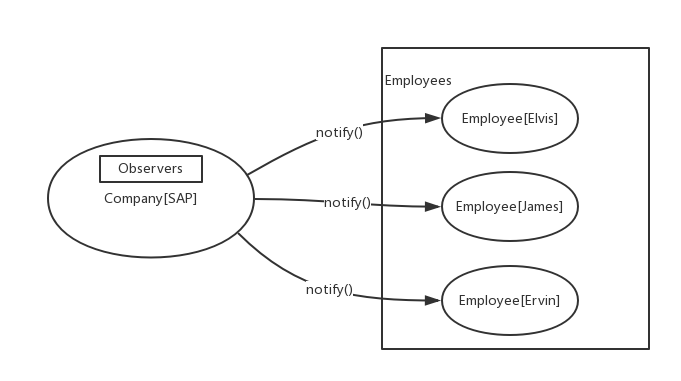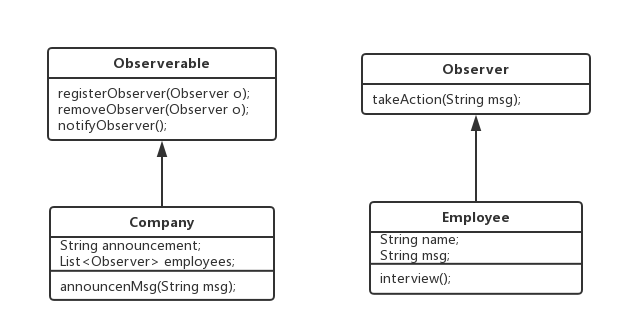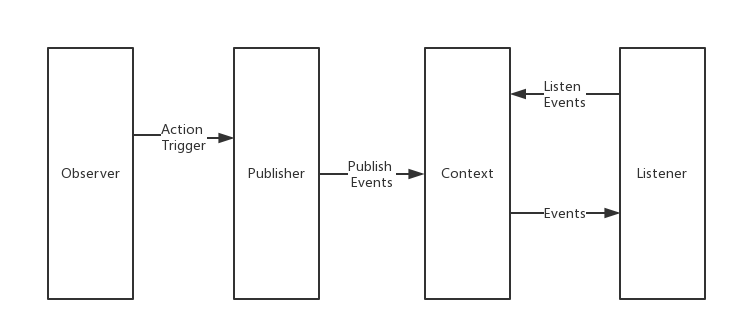- Introduce the Event in Spring.
- Explore the core concept in Spring Event.
- At the same time, introduce the design pattern Observer
Spring Event
Observer Design Pattern
Scenario
- Elvis, James and Ervin are looking for a job. And they all send their resume to SAP. The SAP will make an announcement, arrange interviews and send notification to them. So three guys will take the interviews.
Design
Model

Abstract

Source code
Company.java#notifyObserver()
@Override
public void notifyObserver() {
employees.forEach(employee -> employee.takeAction(announcement));
}
public void announcenMsg(String msg) {
this.setAnnouncement(msg);
notifyObserver();
}
Employee.java#takeAction(String msg)
@Override
public void takeAction(String msg) {
this.msg = msg;
interview();
}
public void interview() {
System.out.println(name + " received msg : " + msg + " and will go to interview");
}
Differences with Publish-Subscribe

Spring Events
sequenceDiagram
Listener->>Spring Context: Listen Event
Observer->>Publisher: Action Trigger
Publisher->>Spring Context: Publish Event
Spring Context->>Listener: Event
Listener->>Event Process: Event

Event Publisher
1. @DomainEvents - Spring Data JPA
- Annotate method in Domain Model class. (DDD)
- Publish single or multi events with return value of the method
- Method invoking time: Spring Data repository's
save(…)methods is called. @AfterDomainEventPublicationis used to potentially clean the list of events to be published (among other uses) when@DomainEventsexists.
@DomainEvents
AccountSaveEvent accountSaveEvent()
{
AccountSaveEvent accountSaveEvent = new AccountSaveEvent();
accountSaveEvent.setAccount(this);
accountSaveEvent.setEventType("AccountSaveEventByJPA");
return accountSaveEvent;
}
@AfterDomainEventPublication
void callbackMethod() {
System.out.println("DATA SAVED!\n"+"WELL DONE");
}
2. Mannual Publish
- ApplicationEventPublisher
- ApplicationContext
- Extends interface ApplicationEventPublisher
@Component
public class AccountEventPublisher {
@Autowired
private ApplicationContext applicationContext;
@Autowired
private ApplicationEventPublisher publisher;
public void publishEventByContext(Account account)
{
AccountSaveEvent event = new AccountSaveEvent();
event.setAccount(account);
event.setEventType("AccountSaveEventByContext");
System.out.println("====================================");
System.out.println("Start to publish AccountSaveEvent by context");
applicationContext.publishEvent(event);
System.out.println("End");
System.out.println("====================================");
}
public void publishEventByPublisher(Account account)
{
AccountSaveEvent event = new AccountSaveEvent();
event.setAccount(account);
event.setEventType("AccountSaveEventByPublisher");
System.out.println("====================================");
System.out.println("Start to publish AccountSaveEvent by publisher");
publisher.publishEvent(event);
System.out.println("End");
System.out.println("====================================");
}
}
- Publisher can publish any Object as Event, because Spring will help to use PayloadApplicationEvent to package the object.
Event Listener
1. @EventListener
- Annotate method.
- Support SpEL for event condition match.
- Can listen multi event class.
@EventListener(condition = "#accountSaveApplicationEvent.valid")
public void handleEvent(AccountSaveApplicationEvent accountSaveApplicationEvent) {
System.out.println("======================================");
System.out.println("Listener listened AccountSaveApplicationEvent");
System.out.println(accountSaveApplicationEvent.getEventType());
System.out.println("======================================");
}
2. @TransactionEventListener
- Base on @EventListener.
- phase : Bind the handling of an event to Transaction lifecycle.
- fallbackExecution: Config Transaction if mandatory for this event trigger.
@Async
@TransactionalEventListener(phase = TransactionPhase.AFTER_COMMIT, fallbackExecution = true)
public void handleEvent(AccountSaveEvent accountSaveEvent) {
System.out.println("======================================");
System.out.println("Listener listened AccountSaveEvent");
System.out.println(accountSaveEvent.getEventType());
System.out.println("======================================");
}
Explore
How to event process method in listener class
- class SimpleApplicationEventMulticaster
@Override
public void multicastEvent(ApplicationEvent event) {
multicastEvent(event, resolveDefaultEventType(event));
}
@Override
public void multicastEvent(final ApplicationEvent event, ResolvableType eventType) {
ResolvableType type = (eventType != null ? eventType : resolveDefaultEventType(event));
for (final ApplicationListener<?> listener : getApplicationListeners(event, type)) {
Executor executor = getTaskExecutor();
if (executor != null) {
// new Runnable(){...} just define Runnable variable
executor.execute(new Runnable() {
@Override
public void run() {
invokeListener(listener, event);
}
});
}
else {
invokeListener(listener, event);
}
}
}
- As for executor in SimpleApplicationEventMulticaster, it is global executor for all Spring Event Listeners. So if we config an async executor and inject it to multicaster, all listeners will process event async.
@Configuration
public class AsynchronousSpringEventsConfig implements AsyncConfigurer {
@Bean(name = "applicationEventMulticaster")
public ApplicationEventMulticaster simpleApplicationEventMulticaster() {
SimpleApplicationEventMulticaster eventMulticaster
= new SimpleApplicationEventMulticaster();
// Inject the ThreadPoolTaskExecutor
eventMulticaster.setTaskExecutor(getAsyncExecutor());
return eventMulticaster;
}
@Override
public Executor getAsyncExecutor() {
ThreadPoolTaskExecutor taskExecutor = new ThreadPoolTaskExecutor();
taskExecutor.setCorePoolSize(5);
taskExecutor.setMaxPoolSize(50);
taskExecutor.setQueueCapacity(25);
taskExecutor.initialize();
return taskExecutor;
}
}
- But if we want only several listeners to process event async, we can use @Async annotation and add some thread pool config. And @Async uses CglibAopDynamicProxy and AsyncExecutionInterceptor to find suitable executors to execute the annotated method.
public class AsyncExecutionInterceptor extends ... {
@Nullable
public Object invoke(MethodInvocation invocation) throws Throwable {
Class<?> targetClass = invocation.getThis() != null ? AopUtils.getTargetClass(invocation.getThis()) : null;
Method specificMethod = ClassUtils.getMostSpecificMethod(invocation.getMethod(), targetClass);
Method userDeclaredMethod = BridgeMethodResolver.findBridgedMethod(specificMethod);
// Find executors configured in configuration class.
AsyncTaskExecutor executor = this.determineAsyncExecutor(userDeclaredMethod);
if (executor == null) {
throw new IllegalStateException("No executor specified and no default executor set on AsyncExecutionInterceptor either");
} else {
Callable<Object> task = () -> {
try {
Object result = invocation.proceed();
if (result instanceof Future) {
return ((Future)result).get();
}
} catch (ExecutionException var4) {
this.handleError(var4.getCause(), userDeclaredMethod, invocation.getArguments());
} catch (Throwable var5) {
this.handleError(var5, userDeclaredMethod, invocation.getArguments());
}
return null;
};
return this.doSubmit(task, executor, invocation.getMethod().getReturnType());
}
}
}
- How does ThreadPoolTaskExecutor execute method async, we can refer the source code in ThreadPoolExecutor.class
/**
* Executes the given task sometime in the future. The task
* may execute in a new thread or in an existing pooled thread.
*
* If the task cannot be submitted for execution, either because this
* executor has been shutdown or because its capacity has been reached,
* the task is handled by the current {@code RejectedExecutionHandler}.
*
* @param command the task to execute
* @throws RejectedExecutionException at discretion of
* {@code RejectedExecutionHandler}, if the task
* cannot be accepted for execution
* @throws NullPointerException if {@code command} is null
*/
public void execute(Runnable command) {
if (command == null)
throw new NullPointerException();
/*
* Proceed in 3 steps:
*
* 1. If fewer than corePoolSize threads are running, try to
* start a new thread with the given command as its first
* task. The call to addWorker atomically checks runState and
* workerCount, and so prevents false alarms that would add
* threads when it shouldn't, by returning false.
*
* 2. If a task can be successfully queued, then we still need
* to double-check whether we should have added a thread
* (because existing ones died since last checking) or that
* the pool shut down since entry into this method. So we
* recheck state and if necessary roll back the enqueuing if
* stopped, or start a new thread if there are none.
*
* 3. If we cannot queue task, then we try to add a new
* thread. If it fails, we know we are shut down or saturated
* and so reject the task.
*/
int c = ctl.get();
if (workerCountOf(c) < corePoolSize) {
if (addWorker(command, true))
return;
c = ctl.get();
}
if (isRunning(c) && workQueue.offer(command)) {
int recheck = ctl.get();
if (! isRunning(recheck) && remove(command))
reject(command);
else if (workerCountOf(recheck) == 0)
addWorker(null, false);
}
else if (!addWorker(command, false))
reject(command);
}
Where to call method multicastEvent()
- abstract class AbstractApplicationContext
protected void publishEvent(Object event, ResolvableType eventType) {
Assert.notNull(event, "Event must not be null");
if (logger.isTraceEnabled()) {
logger.trace("Publishing event in " + getDisplayName() + ": " + event);
}
// Decorate event as an ApplicationEvent if necessary
ApplicationEvent applicationEvent;
if (event instanceof ApplicationEvent) {
applicationEvent = (ApplicationEvent) event;
}
else {
applicationEvent = new PayloadApplicationEvent<Object>(this, event);
if (eventType == null) {
eventType = ((PayloadApplicationEvent) applicationEvent).getResolvableType();
}
}
// Multicast right now if possible - or lazily once the multicaster is initialized
if (this.earlyApplicationEvents != null) {
this.earlyApplicationEvents.add(applicationEvent);
}
else {
getApplicationEventMulticaster().multicastEvent(applicationEvent, eventType);
}
// Publish event via parent context as well...
if (this.parent != null) {
if (this.parent instanceof AbstractApplicationContext) {
((AbstractApplicationContext) this.parent).publishEvent(event, eventType);
}
else {
this.parent.publishEvent(event);
}
}
}
Reference :
[1] Baeldung: How to use events in Spring
[2] Spring Blog: Better application events in Spring Framework 4.2
[3] Zoltan Altfatter: Publishing domain events from aggregate roots
[4] Spring IO: Spring Data JPA - Reference Documentation
[5] Pursue: Simple Analysis Domain Driven Design
[6] Spring IO: Spring 5.1.1 RELEASE Reference Events
[7] luohanguo: The Obeserver Design Pattern
[8] miaoyu: Differences between Observer and Publish-Subscribe Pattern
[9] Github Source Code Example of Spring Events by Elvis
[10] Github Source Code Example of Observer Design Pattern by Elvis
[11] CSDN Blog: Spring Event System
